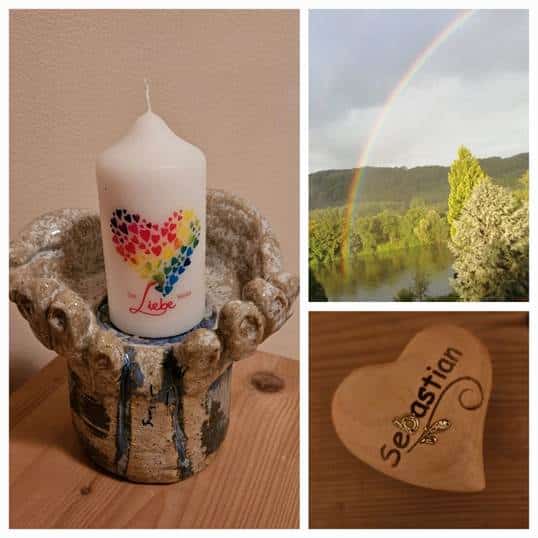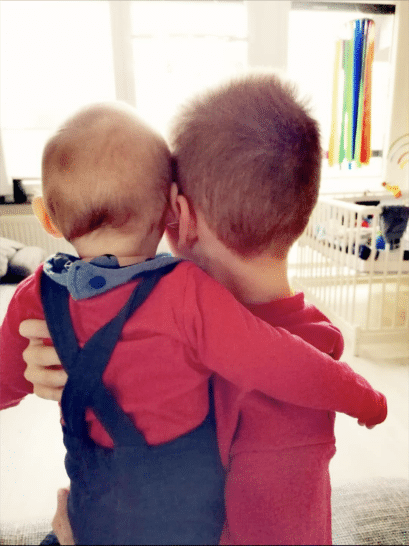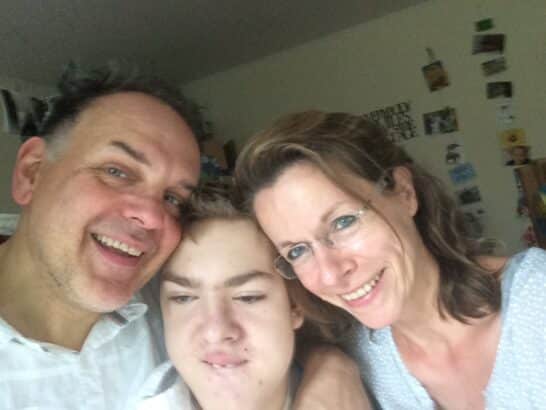“He Was Blessed With Many Years”
Anke Roesch from Germany takes us on her family’s journey with a PCH2 diagnosis. She talks about the years with her son Sebastian – many of them difficult, but also many good ones – who passed away in 2021 at the age of 29.
“Ask away, we are very open about everything.” With this statement, Anke Roesch is able to put her counterpart at ease from the very start of the conversation. Her family, and her children in particular, have also benefited from this care for the needs of others.
Alone
Sebastian, affectionately nicknamed Basti, was born in 1992 as the youngest of the three Roesch brothers. The experienced mother immediately realized that something was different with her youngest, but was initially reassured by the pediatricians.
Only at the age of 3 months did an MRI of the head bring certainty. This was bluntly revealed to the family in the presence of the older siblings, who were 4 and 5 years old at the time. According to the neurologist, Sebastian was a severely multi-disabled child with a life expectancy of 3 years.
However, a definitive diagnosis would not be given until much later.
At the time, there was no safety net in the form of counseling or resources for support. As a result, the family, who had only recently moved to a new home far away from the supportive grandparents, initially faced the situation alone. Alone – with the diagnosis, with their own worries and fears, with the older siblings, and with the little baby who was often restless.
Keeping an Eye on Everybody
“Lots of tears were shed at first, but then we pulled ourselves together bit by bit,” says Anke Roesch. Emotional support came from an elderly couple who the Roeschs were renting from at the time.
The parents tried to balance Sebastian’s care against looking after the older siblings, everyday chores and their own needs.
A strong family bond developed between the five Roeschs.
Anke Roesch remembers: “Our mantra was that we have to do everything we can to make sure Basti is well. But they all deserve their due. All three children are on the same level and are equally important. We did everything together without outside help.”It was important to the parents not to “oblige” the older brothers to help look after Sebastian. Over time, however, this came naturally and voluntarily, and a close bond developed between the brothers.
The First 6 Years Were Very Hard
“Sebastian wasn’t doing well, he cried a lot and basically grew up in my arms,” says Anke Roesch.
He didn’t attend a care facility at that time, so he was looked after by his parents day and night.
When Sebastian became increasingly unwell and had to go to the hospital several times, a young assistant doctor took notice of the family and began looking into Sebastian’s case.
One of her examinations revealed that Sebastian suffered from severe reflux and that his esophagus was on the verge of rupturing.
It was thanks to father Volkmar’s persistence that the doctors, who were initially hesitant, decided to operate in the end. “Basti has always been able to bounce back,” laughs Anke Roesch. Three days after the operation, Sebastian seemed like a new person. Sebastian felt much better, he was calmer, happier and also able to interact much more with the world around him.
Gut Feeling
“We didn’t exclude him from anything, we treated him as normally as possible,” explains the mother of three. “Basti was always in the middle of things. He watched his brothers play from his wheelchair and was with me when I was doing chores or working.”
The family ended their exhausting previous search for therapies and support options.
“We decided to accept him exactly as he is. No more drastic therapies. When Basti comes home from school, it’s home time and he can relax,” says Anke Roesch.
This significantly reduced the stress in the family’s life, even though there were of course still difficult phases.
In addition to the reflux and Sebastian’s gastrointestinal problems, the developing epilepsy was also a great strain.
But the parents were increasingly letting their gut feeling guide them and would do it the same way today.
If Anke Roesch had to give other parents a piece of advice, it would be this: “Listen to your gut. And mothers are only human, we have our limits too and that’s okay.”
A Relieving Diagnosis
As the mother recalls, receiving the diagnosis of PCH2 in 2000, which was then genetically confirmed in 2009, felt almost like happiness. It had come full circle, as the disease now had a name and previous feelings of guilt (“Did I do something wrong?”) could now be let go.
Right from the start, the Roesch family was active on the PCH2 bulletin board. Through the board and visits at the children’s hospice, they received valuable tips and support, but above all they were able to connect and make friends with other families and gather new strength.
Support through networking and easily accessible information, as well as doctors and other professionals who listen and pay close attention – this is what Anke Roesch would have wished for herself and her family back in the day. To make this a possibility for other families, she is still active on the bulletin board today sharing her experiences.
“We Were Well Prepared”
This is how Anke Roesch leads us into the final stage of Sebastian’s life.
When he was 27, Sebastian moved to the Institute for the Blind. His parents had already drawn up an advance directive for their son and let their gut feeling guide them once again by asking the question, “What would we want for ourselves if we were in his situation?”
After his mother had provided plenty of initial help and assistance, he settled in well to his new surroundings, feeling comfortable and benefiting from life in his group.
Sebastian also regularly went on “vacation” at his parents’ house, which was no problem thanks to how close-by they were.
This was also the case in the fall of 2021, when Anke Roesch picked him up to spend some quality time with him at home after his health had deteriorated over the previous year.
Anke quickly realized that something was different this time and alerted her husband and Sebastian’s brothers.
With the whole family present, Basti was allowed to fall asleep peacefully in his brother’s arms that evening. The moment was defined by sadness and gratitude.
In the days after, all his friends and family were able to say goodbye to Sebastian in peace, and the funeral service was also celebrated in his childhood home, thanks to a pastor friend, with the people who had accompanied and loved him.
Their faith and the strong bond within the family also helped them through this difficult time. With rituals such as painting the urn together and through many conversations, the family had created their own safety net.
Basti Will Always Stay With Us
“I knew that I would eventually overcome my sorrow, I still had too many plans in mind.
And ultimately, it’s reassuring that Basti went before us. That way we could be with him until the end.”
Today, Anke Roesch is as active as ever. She is thriving in her role as a grandmother of two and enjoys spending time with her bubbly grandchildren. She and her husband are also spending more time together again, for example in the garden.
But: “Basti will always stay with us. Not a day goes by without people thinking and talking about Basti,” says his mother.
Little has changed in Basti’s lovingly furnished room –
except that Anke Roesch now plays and cuddles with her grandchildren there. Sebastian’s little nephew in particular continues to insist on visiting his uncle Basti at the cemetery regularly.
We Miss His Smile
Sebastian was born into a loving family, grew up loved and cared for, was accompanied and supported throughout his life and was allowed to fall asleep in his brother’s arms, surrounded by his family.
“It’s okay the way it is, but we miss his smile a lot.”
(Anke Roesch)
Share Your Own Story
to support and encourage other families on their journey.


